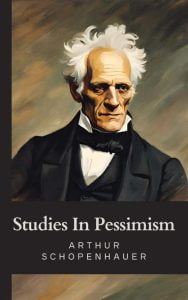
We live in a culture that tells us the key to happiness is to constantly chase our desires. That if we just acquire the right car, house, clothes or experiences, we’ll finally feel fulfilled. But is this really true? Or does the endless pursuit of desire actually lead us down a path of suffering?
One philosopher who believed desire was the root of all human suffering was Arthur Schopenhauer. Now Schopenhauer wasn’t exactly known for an upbeat, optimistic outlook. He saw human existence as fundamentally flawed and filled with pain. He wrote several essays on the study of pessimism
Schopenhauer believed the human will – our constant craving and longing for things – keeps us living in a state of lack. We’re never satisfied with what we have, so we’re perpetually seeking our next hit of dopamine from acquiring something new or achieving a goal. This state of perpetual wanting, argued Schopenhauer, is the source of all unhappiness.
Does this resonate at all? Think about the last thing you bought that you really wanted – a new phone, piece of clothing, gadget, experience. How long did the happiness from acquiring it last before you started looking for your next dopamine fix? For most of us, the euphoria fades remarkably quickly. We get used to our new possessions or achievement and start taking them for granted.
Before long, we’re back to craving and desiring again. Always seeking but never fully satisfied. It’s a hamster wheel of wanting that our culture actively encourages us to stay on. Keep chasing the next thing, and you’ll find happiness, we’re told.
But is this really true? Or are we setting ourselves up for constant, low-level dissatisfaction by buying into this myth of constant desire fulfillment?
Schopenhauer would say our desires actually stem from a deep-seated feeling of lack within ourselves. We feel incomplete or empty inside, so we project that lack outward onto things we don’t have in a futile attempt to fill the void. But no amount of desires fulfilled can ever truly satisfy that inner emptiness. It’s an unsolvable problem at its core.
I’m not saying we should all become ascetic monks and remove all desires from our lives. That’s not realistic or even desirable. But it’s worth considering whether we could find more lasting happiness and fulfillment by learning to be content with what we have, rather than always seeking the next high of desire fulfillment.
What if instead of constantly chasing new desires, things, experiences, we focused on developing inner peace, compassion, meaningful relationships and using our talents to help others? Schopenhauer would argue these types of non-desire based pursuits are much more conducive to long-term happiness than the fleeting fulfillment of wants and cravings.
Our culture trains us to be discontented consumers always seeking an upgrade. But true upgrade is internal, not external. We live in an age of unprecedented choice, opportunity and potential distraction. It’s easier than ever to fill every moment seeking the next desire, and lose ourselves in the process.
I’m not saying I have it all figured out – I still struggle with this myself. But I do think there’s wisdom in Schopenhauer’s view of desire as an unsolvable source of suffering. The path to a less desire-driven, more contented life isn’t easy. It requires becoming aware of how our desires control us, and making a conscious choice to pursue non-desire based happiness instead.
Is constant desire really the key to fulfillment? Or does it just set us up for endless dissatisfaction? I’d argue it’s worth pondering Schopenhauer’s perspective here. True happiness may come more from within than from always seeking the next high of desire fulfillment without. Our culture has it backwards – desire leads to suffering, not salvation. Are you ready to get off the hamster wheel?
Uncover the Profound Insights of Schopenhauer: Read His Essays Absolutely Free

Arthur Schopenhauer’s essays on pessimism offer profound insights into human suffering that are as relevant today as when they were written. In his essay “On the Sufferings of the World,” Schopenhauer posits that suffering is an inherent part of the human condition. He argues that life vacillates between pain and boredom, with brief moments of pleasure providing temporary relief but no lasting happiness. This bleak view of life may seem depressing on the surface, but reading Schopenhauer’s logical arguments and keen observations can be an eye-opening experience. By acknowledging the pervasive suffering in our lives and in the world, we may gain a deeper understanding of ourselves and our place in the universe.
Schopenhauer’s unflinching analysis of human motivation also sheds light on the root causes of suffering. In “On the Vanity of Existence,” he asserts that our strongest drive is not happiness, but rather will, and it is the insatiability of will that leads to conflict and pain. By understanding will as the fundamental driver of human behavior, we can gain insight into why even those with much in the world still desire more. Schopenhauer challenges common assumptions about what brings fulfillment and proposes that true liberation can only be found by detaching oneself from the endless cravings of will. Contemplating these profound ideas can help us reduce suffering in our own lives and gain inner peace by better aligning our actions with the inherent limitations of human existence.
